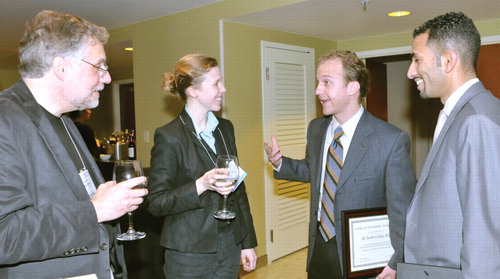APA Fellows Take Matters Into Their Own Hands
Graduates of the American Psychiatric Leadership Fellowship, the oldest fellowship program at APA, have set out to raise funds to continue the program's operation after pharmaceutical maker GlaxoSmithKline (GSK) withdrew its financial support two years ago.
Since 1968 the fellowship has introduced more than 500 residents to organized psychiatry and trained them in leadership skills.
“The fellowship is a priceless experience, especially early in one's career,” said Leah Dickstein, M.D., a former chair of the fellowship's selection committee and a professor emerita at the University of Louisville.
The economic downturn led GSK to shift its priorities, said Alison Bondurant, associate director of APA's Office of Minority and National Affairs. “GSK moved away from funding non-CME programs like fellowships in order to focus on physician education.”

Corporate support for fellowships throughout the medical world has been declining lately. However, with the help of the American Psychiatric Foundation, alumni of the fellowship have begun trying to raise the $100,000 needed each year to keep the program running.
Until GSK ended its grant, the fellowship selected 10 residents each year for a two-year program. Fellows met with the leaders of APA, took part in committee work, and visited congressional offices on trips to Washington, D.C. One fellow in each class took part in APA Board of Trustees meetings, and another worked with the APA Assembly.
“I had the chance to meet residents from other programs as well as the leadership of APA,” said Keith Stowell, M.D., a 2006-2008 fellow and now a postdoctoral fellow at Western Psychiatric Institute and Clinic in Pittsburgh. Gaining professional leadership skills was not the only benefit, he said. Learning how to work in groups during his fellowship years helped Stowell deal with difficult situations that arose during his time as a chief resident.
Fellows also develop and carry out a research project. Stowell's fellowship class surveyed psychiatry residents around the country to examine how pregnancy affects both female and male psychiatrists during residency. They presented the results first at the APA annual meeting in 2007 and then to a meeting of psychiatric training directors.
The subsequent class surveyed safety training programs in psychiatric settings, said Yael Dvir, M.D., a fellow when she was a resident at the University of Massachusetts in Worcester and now an assistant professor there. Dvir said that she valued the chance to meet colleagues from around the country in her areas of interest—child psychiatry and developmental disabilities—through the fellowship program.
“Working on the class project teaches you how to get your ideas across to other people,” she said. “And you learn to see the potential of good ideas in other people who may just need a little encouragement to bring them out.”
Continued funding to support the fellowship was a very worthwhile investment in the future of the profession, she said.
To conserve existing funds, only five fellows were selected for the 2009-2010 class, and they will attend the annual meeting only in 2010, instead of both years.
This current class has been exploring the philanthropic interests of foundations, corporations, program alumni, and the APA Board of Trustees as part of its research project. They gave that information to the foundation, which has the authority within APA for fundraising.
“The membership should be willing to contribute in some small way to fund the program,” Dickstein noted.
Contributors so far (all former fellows) are James Welton Lomax, M.D., Christine Truman, M.D., Keith Stowell, M.D., Tana Grady-Weliky, M.D., Albert John Allen, M.D., Ph.D., and Katharine Phillips, M.D.
Contributions to support the fellowship may be sent to the American Psychiatric Foundation, c/o American Psychiatric Leadership Fellowship, 1000 Wilson Boulevard, Suite 1825, Arlington, Va. 22209. ▪



